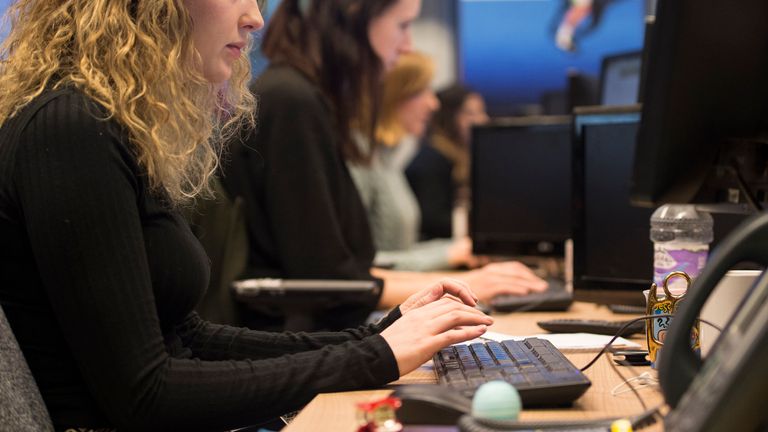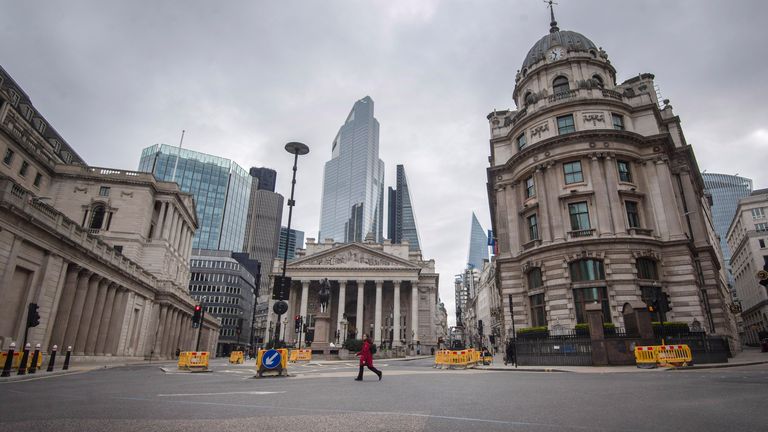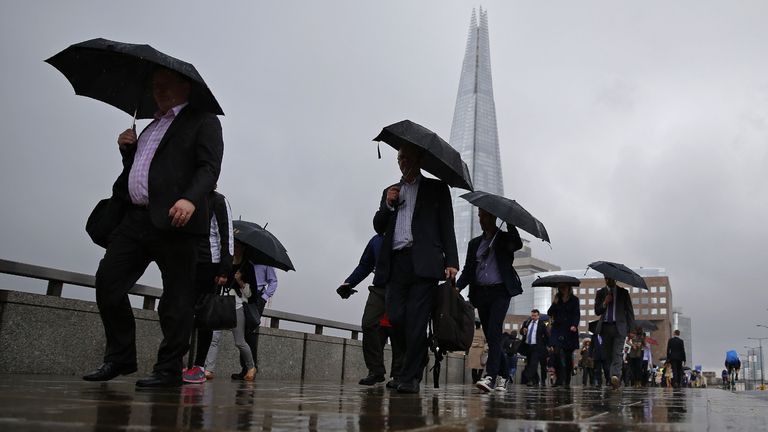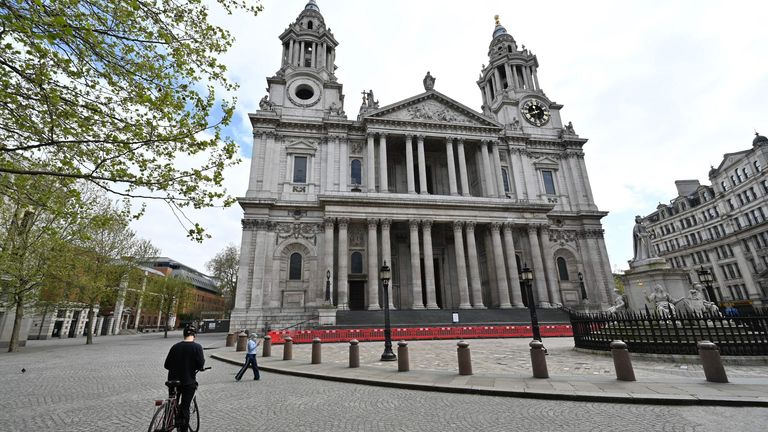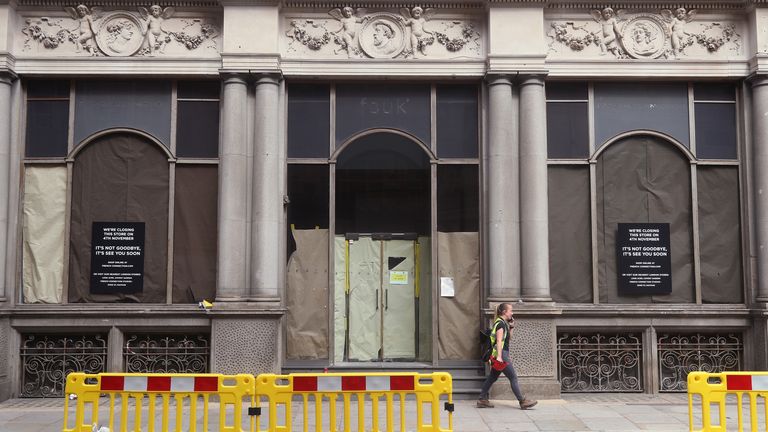Commuting into – and working in – the City daily during the Covid crisis has been an, at times, depressing experience.
I began working in the City 30 years ago and have spent most of the intervening period since working in and around the Square Mile. It is an inspiring place.
:: Follow live coverage of the latest coronavirus news and updates
The City, along with Canary Wharf to the east, is the throbbing engine of UK capitalism.
It is where entrepreneurs raise the money that helps turn their dreams into reality.
It is where more established companies raise the capital that helps them invest in their businesses and create jobs, as well as wealth for their shareholders.
It is where governments far and wide, when they need to borrow money, turn.
It is also where the suppliers of capital – savers and investors – look to see their money put to productive use.
This pulsating financial village currently feels a shadow of its former self.
Even before Boris Johnson announced a lockdown on 23 March, the Square Mile was beginning to depopulate.
On 12 March, the day the FTSE 100 suffered its second biggest one-day fall in history, we broadcast all day from the trading floor of the currency broking and trading firm Oanda.
As cameraman Phil Hooper and I packed up, after an exhausting day, staff were being ushered into a big meeting room.
Hugs and pats on the back were exchanged as they emerged a few minutes later.
Craig Erlam, Oanda’s senior market strategist, explained: “We’ve all just been told we’re working from home for the foreseeable future.”
Within days, the City had started to empty.
The shelves of the M&S Simply Food adjacent to St Paul’s Cathedral, where I often buy lunch, were as full at 6pm in the evening as they were at 8am in the morning.
A heart-breaking sign outside Joe’s Kitchen, a bar and restaurant close to the Sky News City Studio, read: “If you would like to know how it feels to be in hospitality during this coronavirus pandemic – remember when the Titanic was sinking and the band continued to play? Well we are the band.”
It closed the following week and is yet to reopen.
One by one, shops, bars and restaurants – all of which depend on the 500,000 people who before the pandemic streamed into the City and Canary Wharf daily – began to close.
By the end of March, the only people working in the Square Mile were a handful of construction workers, who could not exactly work from home.
The shutdown did have its advantages to those continuing to work in the office.
The time of the commute was cut – assuming, of course, your train was still running.
It was possible to admire the beauty of St Paul’s without fighting through a crowd of sightseers.
Paternoster Square, home to the London Stock Exchange, looked more stunning than ever in the absence of hordes of office workers.
There were few queues to negotiate when buying lunch from one of the handful of supermarkets still open.
It was possible to stand on a pavement, where normally one would be bowled over by tin-elbowed passers-by, simply to take in the surroundings, to look up and admire the gorgeous architecture of the Victorian office buildings the Luftwaffe failed to destroy.
But there were more downsides.
Strolling home through an empty City, a place normally thronged with some of the most ambitious people you will ever meet, was saddening.
Walking past shuttered pubs, bars and restaurants, many of them replete with memories for the last three decades, was soul-destroying.
So I, like the Prime Minister, would love to see people returning to the office and for the City’s working population to be back where it was pre-crisis.
Is it likely? Not in the short-term.
Research published this week by Morgan Stanley, the investment bank, suggests only a third of British office workers have returned to their workplace.
That compares with around three-quarters of workers in other leading European economies.
Big-name employers such as NatWest, Standard Life Aberdeen, Linklaters and Google have said they are happy for employees to continue working from home until next year.
Schroders, the fund management giant, has even told employees they need never return to the office.
To an extent, ministers – horrified at job losses in businesses built on serving commuters, like Pret A Manger – have only themselves to blame.
The public has been terrified out of its wits and has been told for months on end to avoid public transport.
The government cannot expect sentiment to turn on a sixpence and especially given some of the mixed messaging there has been.
To call for a full return to the office misunderstands people.
A lot of workers do not miss the two hours on a packed commuter train slogging to and from Hertfordshire, Essex, Surrey or Kent.
Employers, more aware than ever of mental health issues, are willing to accommodate this on the grounds that a contented worker is a more productive worker.
More crucially, calling for a full return to work also misunderstands business.
The strength of capitalism is that it is constantly evolving, constantly moving with the times and, quite often, ahead of them.
Many banking, broking, accounting, insurance and law firms were surprised and delighted, during the early months of the pandemic, at how easy it was to function with people working from home rather than in the City or the Wharf.
Office rents in these places are among the world’s most expensive.
No surprise, then, that some 69% of chief executives told KPMG, the professional services firm, this week that they plan to downsize their office space in future.
And, ultimately, the priority for businesses is satisfying their clients and customers, looking after their employees and – the latter follows if the first two are being achieved – making money for their shareholders.
Keeping the government happy comes way below those priorities.
Ultimately, the office population will come back, but perhaps not in as many numbers.
As the director of one services business told me early in the pandemic: “We have 13% of our staff on furlough. Are we 13% less productive? No.”
Younger workers, having worked from home in small apartments, may be keener to return to the office than middle-aged colleagues comfortable in large homes with gardens.
:: Subscribe to the Daily podcast on Apple Podcasts, Google Podcasts, Spotify, Spreaker
The City, in particular is a place that thrives on human interaction and gossip – the titbit of information gleaned from a colleague outside on the pavement during a cigarette break or at a conversation at the water-cooler, or during a lunch with a client where that extra glass of wine gets them to reveal something they would never do during a Zoom conversation.
All of that activity makes the City tick and, at the end of the day, human beings crave interaction.
It is what gives the Square Mile its vitality and is what will ultimately get people back in the office.
The alternative is too dreadful to contemplate.
As bankers have become fond of telling each other: “If all this stuff can be done anywhere, we might as well be in bloody Frankfurt.”

